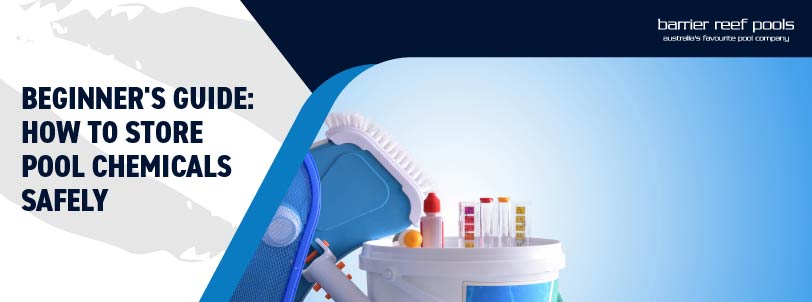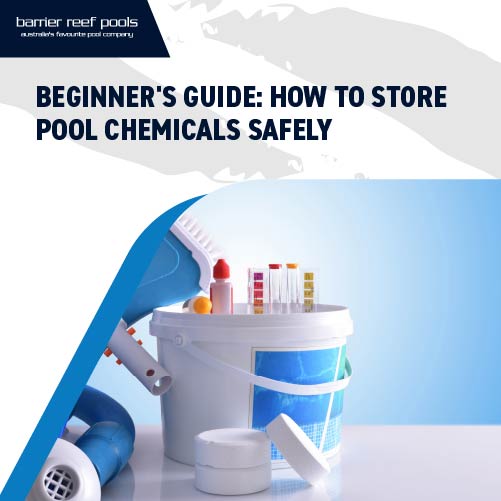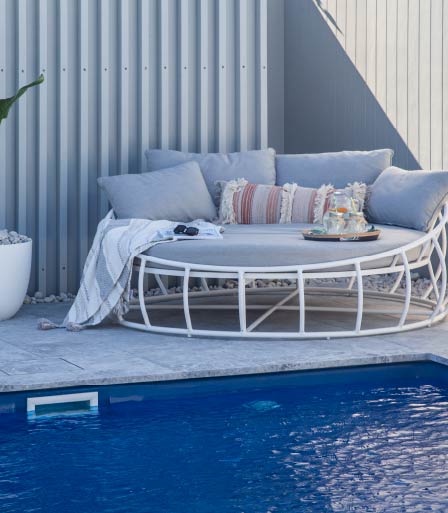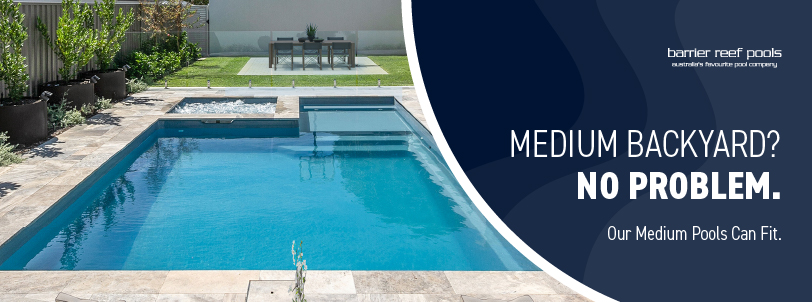Beginner's Guide: How To Store Pool Chemicals Safely
Owning a pool is a luxury enjoyed by many homeowners, but with it comes the responsibility of proper maintenance. One critical aspect of this is the safe storage of pool chemicals. While these chemicals are essential for keeping your pool water clean and safe, improper storage can lead to severe hazards. This guide aims to provide pool owners and home maintenance enthusiasts with the essential knowledge required to store pool chemicals safely, thereby protecting their families and properties. In this comprehensive guide, you will learn about different pool chemicals, understand the risks associated with them, and discover best practices for safe storage and handling. By the end of this post, you'll be well-equipped to maintain your pool safely and efficiently.

Understanding Pool Chemicals
Common Pool Chemicals
When it comes to maintaining pool water quality, several chemicals play a vital role. These include chlorine, pH adjusters, algaecides, and shock treatments. Chlorine is the most commonly used chemical, essential for disinfecting the pool and killing harmful bacteria. pH adjusters help maintain the water’s pH balance, ensuring it stays within a safe range for swimmers. Algaecides prevent and treat algae growth, while shock treatments are used to provide a high dose of chlorine, usually after increased pool usage or contamination.
Role of Each Chemical
Each pool chemical serves a specific purpose that contributes to maintaining the overall health of your pool water. Chlorine acts as a sanitiser, destroying bacteria and viruses present in the water. pH adjusters, which include both pH increasers and decreasers, keep the water balanced to prevent irritation to the skin and eyes and protect pool equipment. Algaecides work to prevent and eliminate algae, ensuring clear water, and shock treatments help maintain chlorine levels, especially during peak usage times.
Importance of Proper Maintenance
Proper chemical maintenance ensures your pool remains a safe and enjoyable environment. Neglecting to balance your pool’s chemicals can result in murky water, algae growth, and harmful bacteria proliferation. Therefore, understanding the role each chemical plays is crucial for effective pool maintenance.
Risks and Hazards
Potential Hazards
Improper storage and handling of pool chemicals can pose significant risks. Chemicals like chlorine are highly reactive and can cause severe burns, respiratory issues, and even explosions if not stored correctly. pH adjusters can be corrosive, leading to damage to your property and injury if they come into contact with skin. Algaecides, while generally less hazardous, can still cause skin and eye irritation if mishandled.
Real-life Examples
There have been incidents where improper storage of pool chemicals has led to severe consequences. For instance, mixing chlorine with other household cleaners can produce toxic gases, leading to respiratory issues and hospitalisation. Statistics show that thousands of people visit emergency rooms each year due to pool chemical-related injuries, highlighting the importance of proper storage and handling.
Importance of Safety
Understanding the risks associated with pool chemicals underscores the need for stringent safety measures. Taking the time to store and handle these substances properly can prevent accidents, protect your family, and ensure your pool remains a safe place for leisure.

Best Practices for Safe Storage
Proper Storage Guidelines
To minimise the risks associated with pool chemicals, it’s essential to follow best practices for safe storage. First, always store chemicals in a cool, dry, and well-ventilated area. Humidity and heat can cause chemicals to react, leading to hazardous situations. Keep chemicals away from direct sunlight and sources of ignition.
Choosing the Right Containers
Using the right storage containers is crucial for maintaining the integrity of your pool chemicals. Always keep chemicals in their original containers with labels intact. These containers are designed to handle the chemical’s properties and prevent leaks. Avoid using food containers or repurposing other household items for storage, as these might not be compatible with the chemicals.
Ideal Storage Location
Select a dedicated storage area for your pool chemicals, preferably outside the house in a secure shed or garage. Ensure this area is inaccessible to children and pets. Use shelves to keep chemicals off the ground and organised, preventing accidental spills or mixing.
Safe Handling and Use
Handling Tips
When handling pool chemicals, always prioritise safety. Wear protective gear such as gloves, goggles, and masks to prevent skin and eye irritation and inhalation of fumes. Read and follow the manufacturer’s instructions and warnings on the chemical containers.
Mixing and Adding Chemicals
Never mix different chemicals together, as this can cause dangerous reactions. When adding chemicals to your pool, always do so one at a time and in small amounts, allowing each to fully dissolve before adding more. Use a designated, clean scoop for each chemical to avoid cross-contamination.
Protecting Yourself and Others
Ensure that everyone involved in pool maintenance is aware of the safety protocols. Educate family members about the dangers of pool chemicals and the importance of not touching or moving the containers. Keep emergency contact numbers and first-aid supplies readily accessible in case of accidental exposure.

Emergency Preparedness
Chemical Spills
In the event of a chemical spill, act quickly to contain and clean it up. Use appropriate materials such as absorbent pads or neutralising agents, and dispose of the waste according to local regulations. Avoid using water to clean up chemical spills, as this can exacerbate the situation.
Exposure and First Aid
If someone is exposed to pool chemicals, immediate action is required. For skin contact, rinse the affected area with plenty of water and seek medical attention if irritation persists. In case of eye contact, flush the eyes with water for at least 15 minutes and consult a healthcare professional. If inhaled, move the person to fresh air and call emergency services if breathing difficulties occur.
Creating an Emergency Plan
Develop an emergency plan that outlines the steps to take in case of a chemical incident. Ensure all family members are familiar with the plan and know how to act swiftly and safely. Keep emergency contact numbers and first-aid supplies readily accessible.
Conclusion
Proper storage and handling of pool chemicals are paramount for ensuring the safety of your family and property. By understanding the role of each chemical, recognising the risks, and following best practices for storage and handling, you can enjoy a clean and safe pool environment.
Remember to stay vigilant, educate your family, and make safety a priority in your pool maintenance routine. Share this guide with other pool owners and home maintenance enthusiasts to spread the knowledge and promote a safer swimming experience for everyone.
Beginner's Guide: How To Store Pool Chemicals Safely
Owning a pool is a luxury enjoyed by many homeowners, but with it comes the responsibility of proper maintenance. One critical aspect of this is the safe storage of pool chemicals. While these chemicals are essential for keeping your pool water clean and safe, improper storage can lead to severe hazards. This guide aims to provide pool owners and home maintenance enthusiasts with the essential knowledge required to store pool chemicals safely, thereby protecting their families and properties. In this comprehensive guide, you will learn about different pool chemicals, understand the risks associated with them, and discover best practices for safe storage and handling. By the end of this post, you'll be well-equipped to maintain your pool safely and efficiently.

Understanding Pool Chemicals
Common Pool Chemicals
When it comes to maintaining pool water quality, several chemicals play a vital role. These include chlorine, pH adjusters, algaecides, and shock treatments. Chlorine is the most commonly used chemical, essential for disinfecting the pool and killing harmful bacteria. pH adjusters help maintain the water’s pH balance, ensuring it stays within a safe range for swimmers. Algaecides prevent and treat algae growth, while shock treatments are used to provide a high dose of chlorine, usually after increased pool usage or contamination.
Role of Each Chemical
Each pool chemical serves a specific purpose that contributes to maintaining the overall health of your pool water. Chlorine acts as a sanitiser, destroying bacteria and viruses present in the water. pH adjusters, which include both pH increasers and decreasers, keep the water balanced to prevent irritation to the skin and eyes and protect pool equipment. Algaecides work to prevent and eliminate algae, ensuring clear water, and shock treatments help maintain chlorine levels, especially during peak usage times.
Importance of Proper Maintenance
Proper chemical maintenance ensures your pool remains a safe and enjoyable environment. Neglecting to balance your pool’s chemicals can result in murky water, algae growth, and harmful bacteria proliferation. Therefore, understanding the role each chemical plays is crucial for effective pool maintenance.
Risks and Hazards
Potential Hazards
Improper storage and handling of pool chemicals can pose significant risks. Chemicals like chlorine are highly reactive and can cause severe burns, respiratory issues, and even explosions if not stored correctly. pH adjusters can be corrosive, leading to damage to your property and injury if they come into contact with skin. Algaecides, while generally less hazardous, can still cause skin and eye irritation if mishandled.
Real-life Examples
There have been incidents where improper storage of pool chemicals has led to severe consequences. For instance, mixing chlorine with other household cleaners can produce toxic gases, leading to respiratory issues and hospitalisation. Statistics show that thousands of people visit emergency rooms each year due to pool chemical-related injuries, highlighting the importance of proper storage and handling.
Importance of Safety
Understanding the risks associated with pool chemicals underscores the need for stringent safety measures. Taking the time to store and handle these substances properly can prevent accidents, protect your family, and ensure your pool remains a safe place for leisure.

Best Practices for Safe Storage
Proper Storage Guidelines
To minimise the risks associated with pool chemicals, it’s essential to follow best practices for safe storage. First, always store chemicals in a cool, dry, and well-ventilated area. Humidity and heat can cause chemicals to react, leading to hazardous situations. Keep chemicals away from direct sunlight and sources of ignition.
Choosing the Right Containers
Using the right storage containers is crucial for maintaining the integrity of your pool chemicals. Always keep chemicals in their original containers with labels intact. These containers are designed to handle the chemical’s properties and prevent leaks. Avoid using food containers or repurposing other household items for storage, as these might not be compatible with the chemicals.
Ideal Storage Location
Select a dedicated storage area for your pool chemicals, preferably outside the house in a secure shed or garage. Ensure this area is inaccessible to children and pets. Use shelves to keep chemicals off the ground and organised, preventing accidental spills or mixing.
Safe Handling and Use
Handling Tips
When handling pool chemicals, always prioritise safety. Wear protective gear such as gloves, goggles, and masks to prevent skin and eye irritation and inhalation of fumes. Read and follow the manufacturer’s instructions and warnings on the chemical containers.
Mixing and Adding Chemicals
Never mix different chemicals together, as this can cause dangerous reactions. When adding chemicals to your pool, always do so one at a time and in small amounts, allowing each to fully dissolve before adding more. Use a designated, clean scoop for each chemical to avoid cross-contamination.
Protecting Yourself and Others
Ensure that everyone involved in pool maintenance is aware of the safety protocols. Educate family members about the dangers of pool chemicals and the importance of not touching or moving the containers. Keep emergency contact numbers and first-aid supplies readily accessible in case of accidental exposure.

Emergency Preparedness
Chemical Spills
In the event of a chemical spill, act quickly to contain and clean it up. Use appropriate materials such as absorbent pads or neutralising agents, and dispose of the waste according to local regulations. Avoid using water to clean up chemical spills, as this can exacerbate the situation.
Exposure and First Aid
If someone is exposed to pool chemicals, immediate action is required. For skin contact, rinse the affected area with plenty of water and seek medical attention if irritation persists. In case of eye contact, flush the eyes with water for at least 15 minutes and consult a healthcare professional. If inhaled, move the person to fresh air and call emergency services if breathing difficulties occur.
Creating an Emergency Plan
Develop an emergency plan that outlines the steps to take in case of a chemical incident. Ensure all family members are familiar with the plan and know how to act swiftly and safely. Keep emergency contact numbers and first-aid supplies readily accessible.
Conclusion
Proper storage and handling of pool chemicals are paramount for ensuring the safety of your family and property. By understanding the role of each chemical, recognising the risks, and following best practices for storage and handling, you can enjoy a clean and safe pool environment.
Remember to stay vigilant, educate your family, and make safety a priority in your pool maintenance routine. Share this guide with other pool owners and home maintenance enthusiasts to spread the knowledge and promote a safer swimming experience for everyone.


